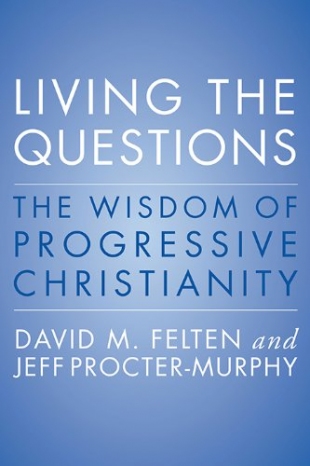More than 6,000 churches and other groups around the world have used Living the Questions, a DVD series and curriculum designed "to expose lay people to the best of contemporary theological thought." The format included video sections, written material, and open-ended discussion questions that "give people permission to wrestle with many of the issues that are too often ignored or avoided by many churches."
The two men behind this impressive project are David M. Felten, a clergyman trained at Boston University School of Theology, and Jeff Proctor-Murphy, who graduated from Claremont School of Theology. Together they have 40 years experience equipping the saints in churches. Felten and Proctor-Murphy continue to collaborate on new sermons and materials for Living the Questions. You can visit them at www.livingthequestions.com.
These two progressives state at the outset: "People are dissatisfied with the core message, dogma, and practice of the Christian faith in today's world." This ambitious paperback is divided into three sections on Journey, Reconciliation, and Transformation. Twenty-one topics are covered including sexuality and homosexuality, which is tearing a large number of mainline churches apart. More conservative members cling to their rigid and irrelevant dogmas and certitudes about the Bible, salvation, the rapture, and other religions.
Some of the wise teachers who appear on these pages with their comments are John Shelby Spong, Sister Helen Prejean, Brian McLaren, Marcus Borg, Karen Armstrong, and Diana Butler Bass.
Felten and Procter-Murphy quote the famous Protestant preacher Harry Emerson Fosdick who said:
"Stagnation in thought or enterprise means death for Christianity as certainly as it does for any other vital movement. Stagnation, not change, is Christianity's most deadly enemy, for this is a progressive world."
The authors correctly call Progressive Christians to live out their authentic mix of faith and doubt, to practice nonviolence, to stand in solidarity with the poor, to eschew the idolatry of wealth, and to seek "justice and inclusivity in a culture dominated by suspicion and fear."
We were very gratified to see Felten and Proctor-Murphy speak out against the myth of redemptive violence which is peddled to kids in animated features and used to brainwash teenagers who are caught up in superhero fantasies. They also do a good job in a concise chapter on practicing resurrection rather than just affirming it in words.
Best of all is their ending this paperback with a paean of praise for "Embracing Mystery." Felten and Proctor-Murphy salute the mystics of the past and some of the present moment who help us to be more open to the Divine, to let go of our clinging to ancient dogmas about God and Jesus, and to surrender to "not knowing" all the answers.
